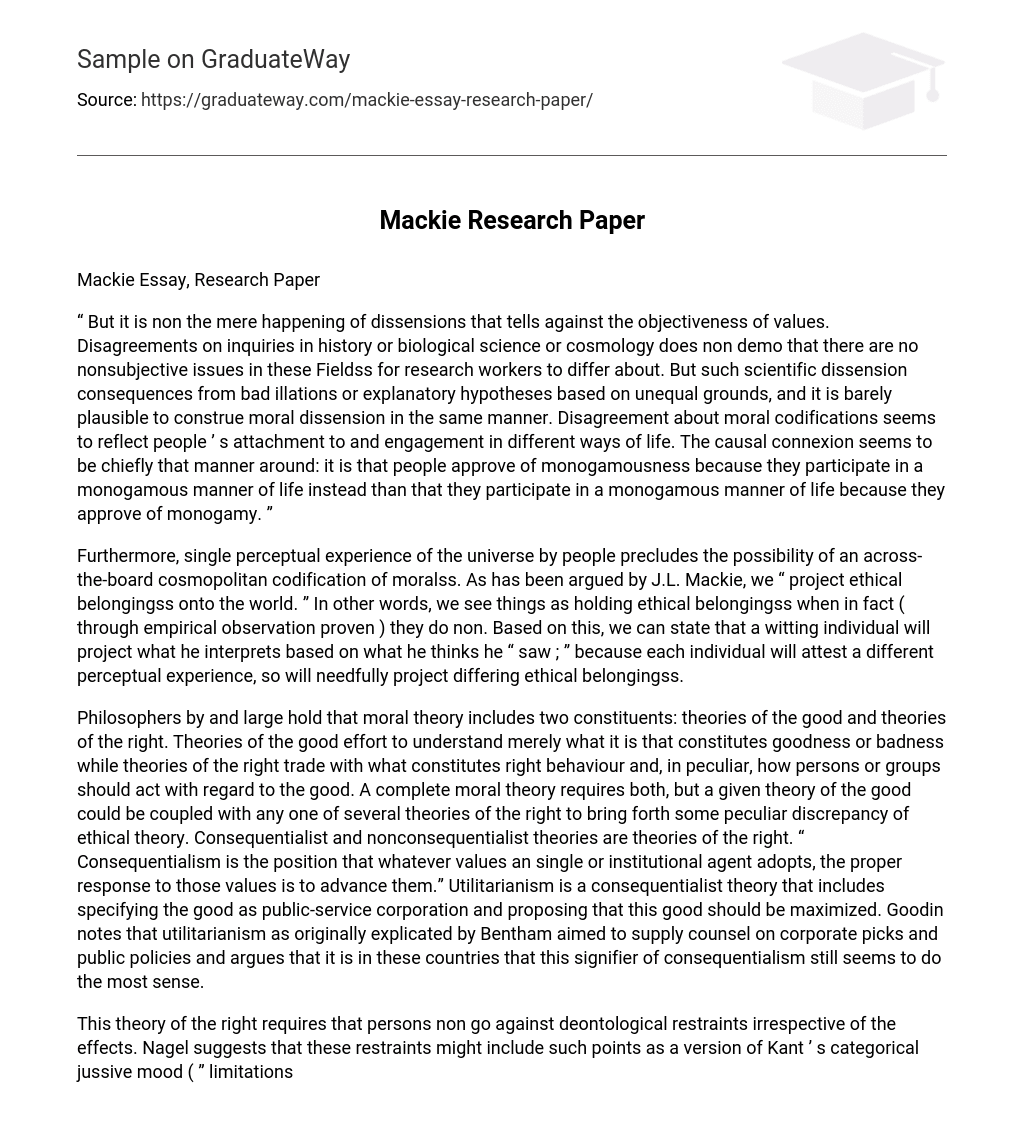Mackie Essay, Research Paper
“ But it is non the mere happening of dissensions that tells against the objectiveness of values. Disagreements on inquiries in history or biological science or cosmology does non demo that there are no nonsubjective issues in these Fieldss for research workers to differ about. But such scientific dissension consequences from bad illations or explanatory hypotheses based on unequal grounds, and it is barely plausible to construe moral dissension in the same manner. Disagreement about moral codifications seems to reflect people ’ s attachment to and engagement in different ways of life. The causal connexion seems to be chiefly that manner around: it is that people approve of monogamousness because they participate in a monogamous manner of life instead than that they participate in a monogamous manner of life because they approve of monogamy. ”
Furthermore, single perceptual experience of the universe by people precludes the possibility of an across-the-board cosmopolitan codification of moralss. As has been argued by J.L. Mackie, we “ project ethical belongingss onto the world. ” In other words, we see things as holding ethical belongingss when in fact ( through empirical observation proven ) they do non. Based on this, we can state that a witting individual will project what he interprets based on what he thinks he “ saw ; ” because each individual will attest a different perceptual experience, so will needfully project differing ethical belongingss.
Philosophers by and large hold that moral theory includes two constituents: theories of the good and theories of the right. Theories of the good effort to understand merely what it is that constitutes goodness or badness while theories of the right trade with what constitutes right behaviour and, in peculiar, how persons or groups should act with regard to the good. A complete moral theory requires both, but a given theory of the good could be coupled with any one of several theories of the right to bring forth some peculiar discrepancy of ethical theory. Consequentialist and nonconsequentialist theories are theories of the right. “ Consequentialism is the position that whatever values an single or institutional agent adopts, the proper response to those values is to advance them.” Utilitarianism is a consequentialist theory that includes specifying the good as public-service corporation and proposing that this good should be maximized. Goodin notes that utilitarianism as originally explicated by Bentham aimed to supply counsel on corporate picks and public policies and argues that it is in these countries that this signifier of consequentialism still seems to do the most sense.
This theory of the right requires that persons non go against deontological restraints irrespective of the effects. Nagel suggests that these restraints might include such points as a version of Kant ’ s categorical jussive mood ( ” limitations against enforcing certain forfeits on person merely as a agency to an terminal ” ) , authoritative virtuousnesss translated into injunctions non to lie, betray, interruption promises, or cause injury, and demands that certain rights be respected. The word deontology has its root in the Grecian word for responsibility, proposing that deontological restraints can be seen as responsibilities or duties. These responsibilities can frequently be translated into the linguistic communication of rights. A responsibility non to do injury to others provides a footing for claims to hold a right non to be harmed.
For many, the footings deontological, nonconsequentialist, and rights-based are used more or less interchangeably. Dasgupta, Ellis, Sen, and Thompson, Matthews, and van Ravensway, for illustration, all set up contrasts between consequentialist and rights-based theories. Although the connexion between nonconsequentialist and rights-based ethical attacks seems common, there may be some disadvantage to handling them as precisely tantamount. Nagel and others argue that deontological restraints are merely violated by knowing actions. Therefore, a responsibility non to harm others would non be violated if one causes injury by chance or accidentally. But if the responsibility non to do harm corresponds to a right non to be harmed, the right would be violated irrespective of the purpose of the lawbreaker.





